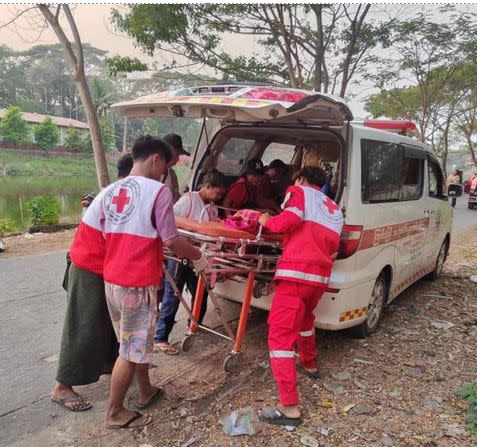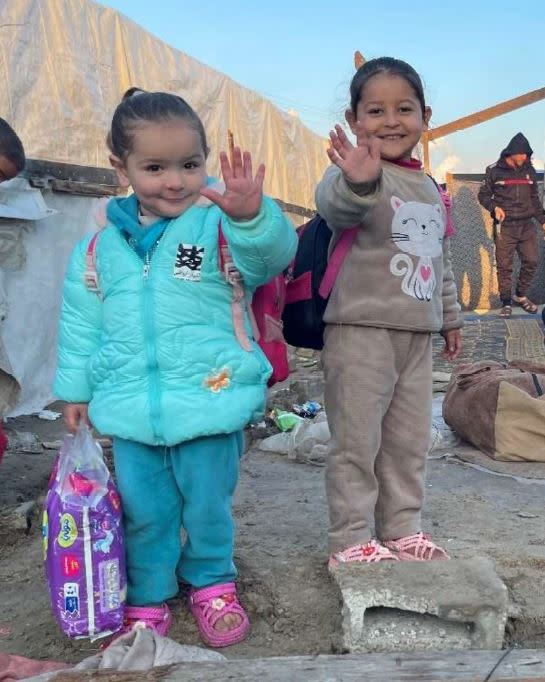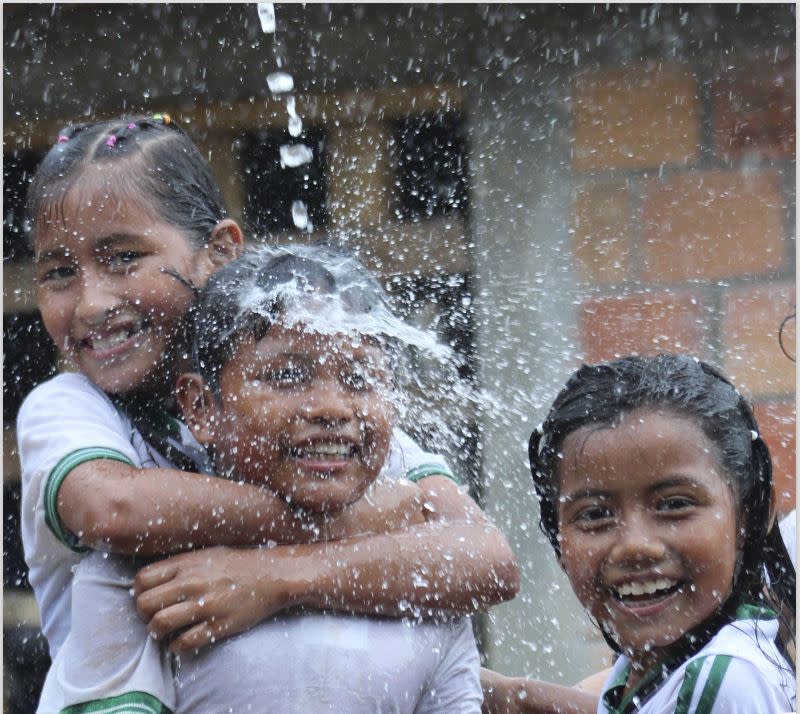Our Mission
The International Committee of the Red Cross (ICRC) is an impartial, neutral and independent organization whose exclusively humanitarian mission is to protect the lives and dignity of victims of armed conflict and other situations of violence and to provide them with assistance.
The ICRC also endeavors to prevent suffering by promoting and strengthening humanitarian law and universal humanitarian principles.
Established in 1863, the ICRC is the origin of the Geneva Conventions and the International Red Cross and Red Crescent Movement. It directs and coordinates the international activities conducted by the Movement in armed conflicts and other situations of violence.
How Your Donations Help
- CHF0.42 1 kg of bread distributed in Afghanistan 4 people in Afghanistan
- CHF2.29 1 mosquito net distributed in Ethiopia. 4 people in Ethiopia
- CHF3.55 1 hygiene parcel for a family of 4 4 people for 1 week in Burkina Faso
- CHF17.90 First aid kit 5 people for one month in Afghanistan
- CHF1.30 1 kg of wheat flour distributed in Ethiopia. 4 people for 1 week in Ethiopia
- CHF6.85 1 solar lamp for a family of 4 4 people for 1 year (or longer) in Burkina Faso
Donate Now
Our Impact
about 2 months ago — Myanmar

THE ICRC’S RESPONSE TO QUAKES IN A CONFLICT ZONE On March 28, a devastating 7.7 magnitude earthquake struck Myanmar. Early reports indicate that thousands of people have been displaced, injured, killed, or are unaccounted for. Following the earthquake, the ICRC immediately began responding in Mandalay and is closely monitoring the situation to continually assess the needs as they arise. In collaboration with the Myanmar Red Cross Society and the International Federation of Red Cross and Red Crescent Societies, the ICRC is preparing to assist those affected, particularly communities already impacted by conflict and violence. All ICRC structures in Myanmar remain operational. The ICRC's sub-delegation in Mandalay, staffed by 45 members, is in contact with the Myanmar Red Cross Society and has started assessing the needs in the area. Stocks for economic security, water and habitat, and health activities are prepositioned near the epicenter, with plans to build a sustainable supply of relief goods. On March 30, four emergency units of the Myanmar Red Cross and the first ICRC convoy left Yangon to provide medical support to teams rescuing people from the debris. The ICRC donated six emergency health kits, each sufficient to meet the medical needs of 10,000 people for three months, and 600 body bags to local health structures and emergency responders to ensure proper management of human remains, improving the chances of families being notified of their loved ones' fate. Additional supplies, including medical kits, body bags, and chlorine tablets, are being dispatched to support medical responders due to the heightened risk of cholera and diarrhea. The ICRC is coordinating its material donations with local responders and other relevant actors. It will also support the establishment of Myanmar Red Cross emergency response teams, including mobile clinics. The ICRC has taken measures to support 45 primary healthcare facilities, 23 hospitals, and 7 physical rehabilitation projects. To help people access clean water, the Myanmar Red Cross will deploy water-treatment units in Sagaing, Mandalay, and NayPyi Taw to support about 2,500 people. The ICRC helped repair these units and trained National Society staff in their use. The ICRC estimates that 119,000 people will benefit from water and habitat projects. Your compassion and generosity are the driving force behind our efforts. Visit www.icrc.org for Myanmar: Earthquake response | ICRC
6 months ago — Africa

In 2023, 149 million people in Africa faced food insecurity, with 82% of them—122 million—living in conflict zones. This stark reality highlights that violence and instability are the primary drivers of Africa’s food crisis. At the end of March 2024 already, 158.5 million people in West African countries, including the Sahel and Lake Chad Basin, struggled to find sufficient food. Food security in the African continent is a cyclical, persistent concern, particularly during the lean season. Armed conflict impacts every dimension of food security: people displaced by hostilities lose access to their fields and other sources of livelihoods. Farmers and herders face conflict-related risks in carrying out their work, which impairs their ability to produce enough food. Essential services providing access to water and sanitation are disrupted, leading to outbreak of water-borne diseases and increasing the risk of malnutrition, particularly amongst young children. The conduct of hostilities may also directly imperil the delivery of health care and humanitarian aid. The International Committee of the Red Cross (ICRC) stands out as a multidisciplinary, protection-focused, and principled food security actor in war zones and other situations of violence. Our approach is tailored to the complexities of armed conflicts. Nearly half of our Africa budget—346 million Swiss Francs—directly or indirectly addresses food insecurity across 17 countries. Our unique access to conflict-affected regions of Africa – along with your support – would enable us to deliver life-saving aid to starving families, strengthen community resilience by reinforcing their food production capacities, and improve access to essential services for millions of families across Africa. We work towards reducing communities’ exposure to risks created by armed conflict and other violence – for example, the risk of sexual violence that women face going to work in the fields. We provide emergency food assistance to those most in need, and help people cultivate their fields or rear their livestock. We maintain and support essential services, such as primary health care and access to water, sanitation and hygiene, in the fight against malnutrition. In 2024, 1,113,190 people obtain adequate food from the ICRC, and 3,957,713 people who will produce food more sustainably in Africa utilizing tools and seeds provided by the ICRC. You can find more information about our work at our website www.icrc.org
3 months ago — Israel and the occupied territories

The ICRC stands ready to continue acting as a neutral intermediary, so that more hostages and detainees are released and able to return home to their relatives. The ICRC reiterates its longstanding call for all hostages to be released in a safe and dignified manner, for the ICRC to have access to all hostages and detainees, and for more aid to enter Gaza, where civilians are still struggling to meet their basic needs for food, potable water, shelter and health care. Below are some 2025 highlights of the ICRC’s response in three key areas: provision of water, medical care, and the ICRC's role as a neutral intermediary between the parties to the conflict. Ceasefire and Humanitarian Needs A ceasefire agreement between Israel and Hamas took effect on January 19, 2025, providing much-needed relief for millions of civilians. However, the consequences of the hostilities remain significant and will have lasting impacts. Tens of thousands of people have been killed or wounded, and hundreds of thousands have been displaced – often repeatedly. Families are now on the move, venturing further than they have over the past 15 months. Unfortunately, they face new dangers such as unexploded ordnance. People are struggling to meet their essential needs for food, shelter, water, and health care, and preventable deaths are occurring due to secondary causes, including lack of safe water and nutrition. The ceasefire agreement offers not only an opportunity to deliver critically needed emergency assistance but also a cause for hope. Provision of Water Since early October 2023, the ICRC has helped more than 1.4 million people gain access to clean water. Since the ceasefire's implementation, our Water and Habitat teams have been able to: • Scale up the flow of critical items into Gaza. • Provide support to find quick fixes for water infrastructure in newly accessible areas such as Rafah, eastern Khan Younis, and others. • Deliver two water tankers, each with a capacity of 5,000 liters, to provide drinking water to those in need. • Supply five mobile wastewater pumps to evacuate raw sewage during malfunctions or breakdowns at pumping stations or manage high overflows, thus limiting the risk of disease spread. • Donate 6,450 liters of generator oil to power hospital generators. Medical Care Between May 9 and December 6, 2024, the Red Cross field hospital in Rafah, established by the ICRC and the Norwegian Red Cross in partnership with over a dozen Red Cross National Societies, provided: • 49,153 consultations. • 2,154 surgical procedures. • Admission for 1,247 people for various treatments. Neutral Intermediary Role As a neutral intermediary, and in line with the ceasefire agreement, the ICRC is conducting a multi-phase operation to facilitate the safe release and transfer of hostages held in the Gaza Strip and Palestinian detainees in Israeli custody. The ICRC continues to advocate for safe, private, and dignified release efforts. Please see more updates and information about our work in this region at our website www.icrc.org
6 months ago — Ethiopia, Myanmar, others

The ICRC’s water and habitat programme aims to restore or expand access to a wide range of essential services for people-affected by conflict – and ultimately, improve their living conditions and quality of life. Ethiopia: clean water closer to home In Ethiopia, a lack of running water was a daily reality for thousands in Roggee, a small town in Oromia region affected by both conflict and climate change. Hindia Adem, a seventy-year-old resident, says: “At my age, I walked 20 kilometers to fetch dirty water. We left for water at 2am and returned at 1pm. Our children were exhausted.” Everything changed after we dug a deep water well and set up a system consisting of pumps powered by solar panels and a back-up generator, and pipes connecting the water source to the local clinic, cattle troughs and other important facilities. “Now we are free from all that burden,” she says. “I feel so delighted for a moment like this.” Myanmar: a place to call their own Many areas of Kachin State in Myanmar have now become silent spaces scarred by armed conflict, with many people forced to flee for their safety. “We had been living in the camp for ten years,” says Ngwa Lu Paw. But every family deserves a home of their own. So, we built one for him and his family, and dozens of others. We equipped each house with a kitchen, a private toilet, solar power and clean water systems. “We are grateful that we now have a place to live” he says. His child has already put a personal touch on their new walls. ICRC helped 36 million people will have better access to clean water and other basic services. You can make a difference - thank you for your support.
Causes We Support
Countries We Serve
United Nations Sustainable Development Goals
Good Health: In 2022, ICRC has provided the supplies, equipment, training assistance to 786 primary-health-care centers in conflicts' affected areas. 3,084,591 vaccine doses provided, including polio vaccines for children under 5 years old. 324,262 people received services, including support to facilitate their social inclusion, at physical rehabilitation centers run or supported by the ICRC. Clean Water and Sanitation: 53,352,238 people gained access to clean water for drinking, irrigation or household use, reduced their exposure to environmental health risks or saw improvements to their general living conditions. Reduced Inequalities: 1,778,584 people benefited from income support, such as multipurpose cash assistance, cash-for-work projects, business grants, equipment or raw materials for microeconomic initiatives, and other assistance aimed at protecting, restoring or augmenting their household income. 71,023 people benefited from capacity-building initiatives – such as skills training or support for community-based cooperatives – that enhanced their livelihoods, helped them make the most out of their trade or boosted their employment prospects. Climate Action: The ICRC is committed to ensuring that our humanitarian operations “do no harm” to affected populations or host communities, i.e. that we do not contribute to environmental degradation or pollution or worsen the impact of climate change. We have therefore been making continuous efforts to reduce the environmental footprint of our operations and maximize their sustainability. Partnerships for Goals example is the Goma West Resilient Water Supply Project (GWWP) which is currently in year 4 of its implementation and aims to develop urban infrastructure in fragile settings. Working in support of the North Kivu Province, the ICRC is coordinating the various instruments of humanitarian assistance, development cooperation and private sector investment in a complimentary and coherent manner in accordance with respective mandates. Our ambition is to deliver safe, accessible, sustainable and affordable water services to people in Goma while leveraging the lessons learned to scale innovative approaches and partnerships for multi-year engagements in fragile settings.